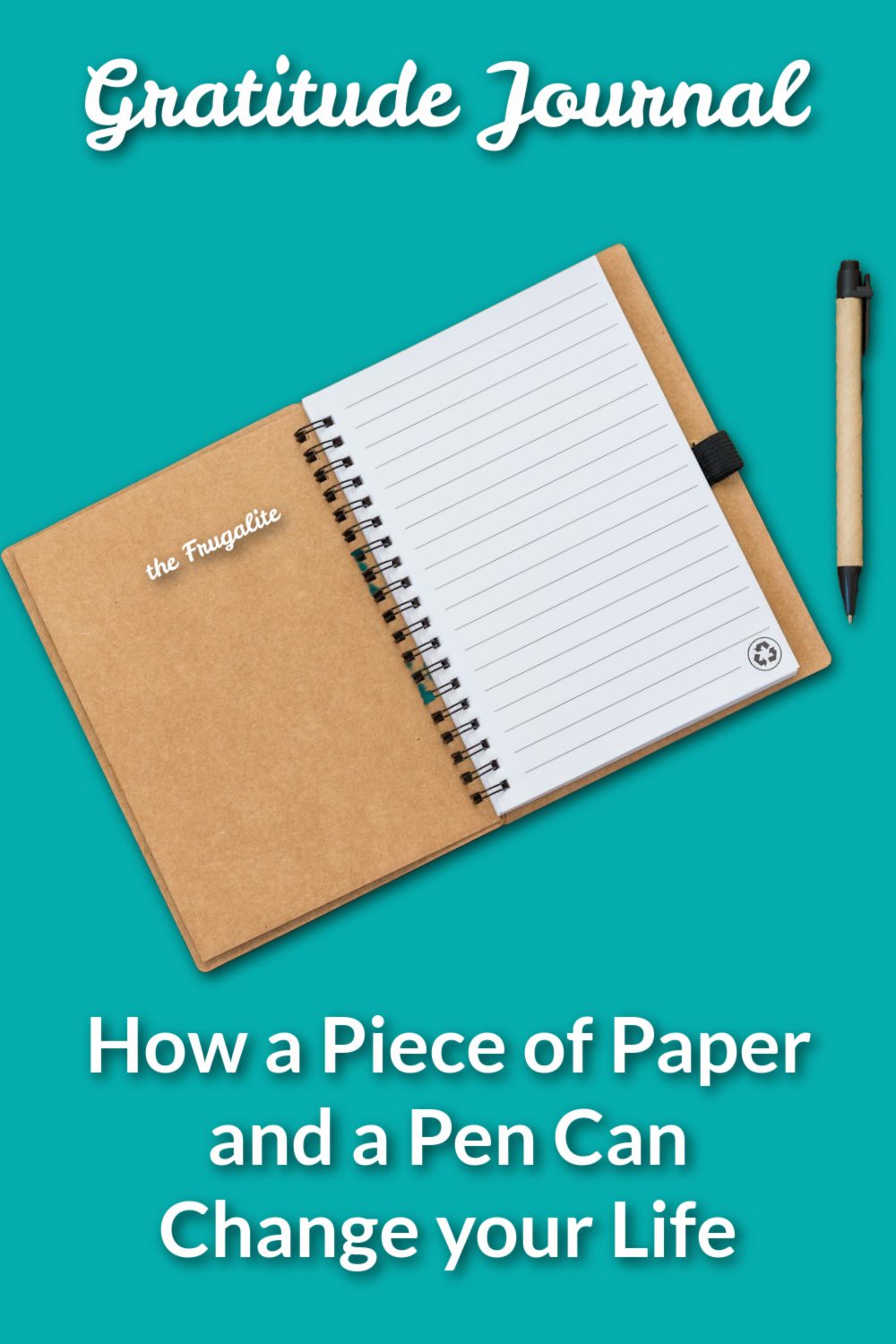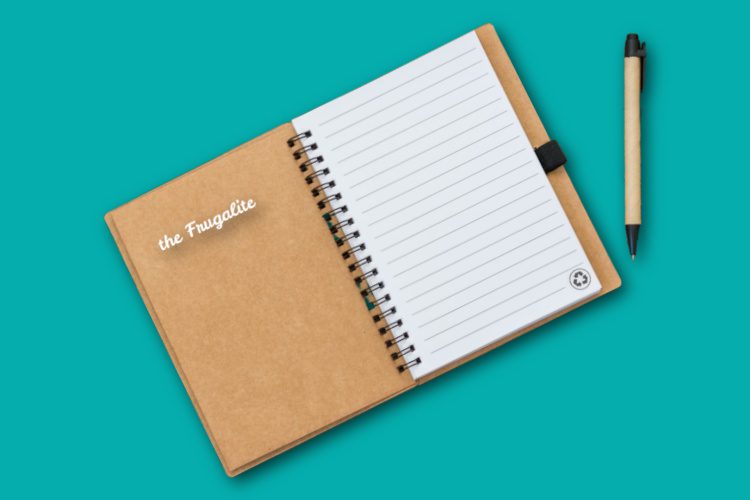(Psst: The FTC wants me to remind you that this website contains affiliate links. That means if you make a purchase from a link you click on, I might receive a small commission. This does not increase the price you’ll pay for that item nor does it decrease the awesomeness of the item. ~ Daisy)
A gratitude journal can be as simple as piece of paper and a pen. And neither of those cost much. As a matter of fact, you probably have those on hand. What if I told you that this modest investment, along with some of your time each day, could provide more benefits to your health and well-being than you might have ever dreamed? Grief, anxiety, and depression can benefit from simple gratitude practices that don’t cost any more than time and genuine effort.
Today, I share a simple practice you can do to improve your health and well-being: a gratitude journal. Perhaps you might be thinking, “This is a load of new-age malarkey” (or even something a bit more colorful than that). Please don’t stop reading! It is totally fine to be skeptical of this idea. I will be providing proof from scientific research and the field of neuroscience to support my claims of the benefits of a gratitude journal. Stick with me, and you will see why all the excitement.
What is Gratitude?
What is gratitude? When we look to the actual roots of the word gratitude, we find the Latin root, “gratia,” which means “gratefulness or thankfulness.” Some researchers believe that gratitude is an emotion that looks outside of ourselves, with a positive feeling of appreciation and thanks directed towards God, others for helping us, fate, or even nature.
Reaching as far back as Ancient Rome, Cicero, the author and politician, stated: “Gratitude is not only the greatest of all virtues but the parent of all others.”
As I review scientific research on the benefits of gratitude and its’ practices, we will see how true Cicero’s wisdom rings in today’s modern world.
What is the scientific proof that gratitude “works”?
The field of neuroscience has discovered that gratitude has significant impacts on the human brain, including the ability to redirect towards more positive emotions. For example, feeling gratitude, a positive emotion enhances neurotransmitters’ production (dopamine, serotonin). These neurotransmitters are responsible for chemically creating a feeling of happiness in the brain. Furthermore, gratitude can help reduce fear and anxiety by supporting the regulation of stress hormones in the body.
It’s never too late to start, either. Incredibly, feeling gratitude at any age can even “rewire” your brain, inspiring it to grow and send signals to “new neural connections to our bliss center.” Finally, encouraging more gratitude in your thinking can even help restructure how your mind works, directing your thoughts in a more positive direction. Other health benefits from gratitude found in research include reducing depression and anxiety and physical pain. Some research has found gratitude practices linked to improved sleep quality. [source]
Gratitude doesn’t just work on minor health issues
Studies have found that people experiencing significant health issues, such as cardiac patients and even those with heart failure, have improved outcomes based on gratitude. In addition, gratitude appears to provide some protection from burnout in more grateful workers. Interestingly, a focus on gratitude has other positive outcomes. For example, the increased development of positive traits, such as “patience, humility and wisdom,” as well as enhanced social connections rooted in people being more “generous, kind and helpful.” [source]
So, could it be Cicero was on to something?
A simple gratitude practice for daily use
What is optimistic about these research benefits is that anyone can create them through readily available simple practices. You may feel some benefit in your mood immediately after daily gratitude practice, as you focus on those positive feelings. Research studies found significant effects on health and well-being occurred in as little as eight weeks.
A gratitude journal can be as simple as freewriting a couple of pages each day about what you were grateful for that particular day. You can also include people, things, or events from your past that come to mind that you appreciate. For a while, I kept a gratitude journal by making a list each night before I went to bed. The list included ten people or things I was thankful for in my life. Sometimes it was a positive happening that day. And, sometimes it was a chance to remember a person from my past, such as a helpful, kind teacher.
In my own experience, the most important part of the journal is that it allows you to connect with the natural feeling of gratitude. Try to focus on the feeling part of yourself, and let your “thinking” mind take a rest. It will not help your practice if you are thinking, “Am I feeling better yet? Is this working? I think this is a waste of time.”
If you find you have critical thoughts, take a deep breath and redirect yourself towards your feelings of gratitude inspired by that day or your memories. It’s best if you can do this in an unhurried way, where you take some quiet time and will not be interrupted.
Some people might prefer a more directed gratitude journal
In her article “The Neuroscience of Gratitude and how it Affects Anxiety and Grief,” Madhuleena Chowdhury offers the following four prompts to structure a gratitude journal:
- Compliments I would like to give myself today
- Current challenges and what I am learning from them
- People I am grateful for
- Significant assets of my life at present
Perhaps one of these prompts might be more relevant for a particular day. Or you might like to fill all four out each day. What is important is that the practice you create suits your personality and how you want to do things.
Everyone is different, and your gratitude journal should suit you. You might prefer to write it on your tablet in the morning or use a nicely decorated paper journal before bedtime. Another person might like to jot some notes during lunchtime. Do you pray every day? Perhaps you have already built a gratitude practice into your prayer.
There are so many options for how to take time to focus on the feeling of gratitude. Cicero knew long ago something that science is now telling us: gratitude is a powerful emotion! I hope that this article has offered you some new appreciation for just how powerful it can be. I wish you the best if you decide to start a gratitude journal of your own.
We are grateful for your comments!
The Frugalite community of readers is thoughtful and generous with what they share. Do you have a gratitude practice already in place in your life that you feel benefits you, whether connected to your faith or not? Could you see yourself trying out the gratitude journal practices offered here? If yes, we would love to hear what your experience of it is. Please share your thoughts about gratitude and keeping a gratitude journal in the comments below.












4 thoughts on “Gratitude Journal: How a Piece of Paper and a Pen Can Change your Life”
I do believe you are on to something.
Being grateful, is well, being grateful.
In the mix I think you’ll find humbleness and meekness.
Ha, the parent you mentioned.
Thanks.
Michael
Hi Michael, Thank you for your thoughts on this. I do agree that a focus on being grateful does seem to connect us with other qualities, such as humbleness, that have other benefits, as well. I appreciate your taking the time to share.
I like this idea. I dont think a person can be too grateful and having it written down to reflect on when you are being pulled into stress and self absorption might help to recenter, refocus on the positive. I will give it a whirl!
Hi Pamela, Thank you so much for your thoughtful response. You have added something quite important here: the idea of using your own journal as a resource to review and draw inspiration from in difficult times. I would love it if you are able to pop by again after you try it to let us all know how it goes. Wishing you the best!